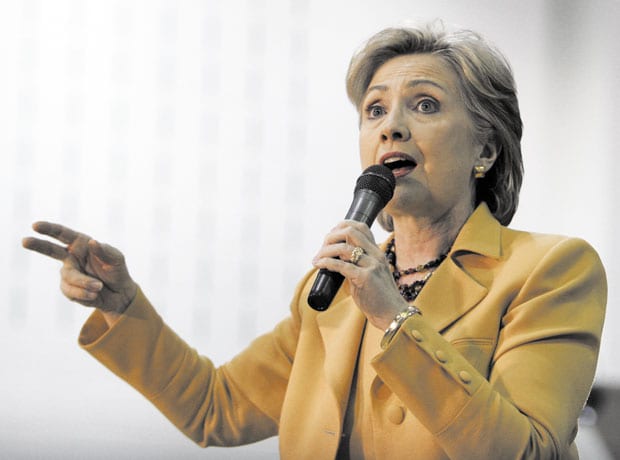Lisa Keen | Keen News Service
lisakeen@mac.com
LGBT issues have come up relatively little so far in the current presidential primary campaigns. But a poll out of Iowa last week says such issues do have an important influence in who likely caucus goers will choose to support.
The first crucial voting begins Feb. 1 in the Iowa caucuses, followed by the New Hampshire primary on Feb. 9.
According to a poll published Jan. 14 by Bloomberg Politics and the Des Moines Register, support among likely Democratic caucus participants in Iowa is basically split between former Secretary of State Hillary Clinton and U.S. Sen. Bernie Sanders of Vermont.
Clinton has 42 percent and Sanders has 40 percent. Former Maryland Gov. Martin O’Malley has 4 percent, and the margin of error is plus-or-minus 4.4 points.
Importantly, the other 14 percent are undecided.
The Register survey of likely Republican caucus goers found 25 percent prepared to support U.S. Sen. Ted Cruz of Texas, 22 percent behind real estate mogul Donald Trump, 12 percent for U.S. Sen. Marco Rubio of Florida, and 11 percent for neurosurgeon Ben Carson.
Twenty points are spread out in low single digits among the rest of the Republican field: U.S. Sen. Rand Paul of Kentucky, former Govs. Jeb Bush of Florida and Mike Huckabee of Arkansas, Govs. Chris Christie of New Jersey and John Kasich of Ohio and former Hewlett Packard executive Carly Fiorina.
Former Virginia Gov. Jim Gilmore is still in the race but has not polled even 1 percent from the beginning of his campaign.
The Register’s survey, taken Jan. 7-10, asked 503 “likely” Democratic caucus-goers how important “social issues like abortion and gay marriage” are to their decision about which candidate to support: 81 percent said they were either “extremely important” or “important.”
Still, the influence of these social issues was smaller than every other issue the Register asked about: “The economy” (99 percent),
“National security” (96 percent), “Civil rights” (95 percent), “The gap between rich and poor” (94 percent), and “Taxes” (90 percent).
The answers of 500 Republican likely caucus-goers were similar on “abortion and gay marriage”: 80 percent said the issues were “extremely important” or “important” to their choice of candidate.
The influence of other issues was somewhat similar with one exception: “The economy” and “National security” (both 99 percent) were the top influencers, “Taxes” (94 percent), and “Civil rights” (86 percent). “The gap between rich and poor” trailed far behind (55 percent).
The Register included data on Iowa frontrunner Cruz specifically, showing that 78 percent of likely Republican caucus goers find it “attractive” that Cruz is “guided by Christian values in opposing abortion and gay marriage.”
Only 18 percent found his position “mostly unattractive” or “very unattractive.” Ninety-four percent said they found it “attractive” that Cruz “could be counted on to base his decisions on the U.S. Constitution.”
The position of the candidates on “gay marriage” or other LGBT-related concerns has come up relatively few times during the several nationally televised debates. Most times, the reference is just in passing, such as during the Jan. 17 Democratic debate when Clinton, talking about young voters, said that there has been an “assault” by Republicans on the rights of gays and lesbians.
Cruz, during the Jan. 14 GOP debate, tried to diss Trump by saying his opponent represented “New York values.” He said, “Everybody understands that the values in New York City are socially liberal and pro-abortion and pro-gay marriage.”
In less publicized moments, some candidates have elaborated on their well-known positions on marriage for same-sex couples: Republicans against and Democrats for.
USA Today pointed out in November that Rubio was making confusing statements on the issue in Iowa. In one interview, he suggested it was right for Kentucky county clerk Kim Davis to disobey the U.S. Supreme Court decision striking state bans on marriage for same-sex couples. Later, at an event for religious leaders, he said “civil disobedience would be Biblically justified” if “we are no longer able to change the systems and the laws we have in place.”
Whatever the muddle might mean, Rubio’s polling in Iowa is roughly the same as it is nationally: about 12 percent and in third place.
Meanwhile, the polls of party voters nationally have been somewhat volatile. According to one poll, Clinton led Sanders by 20 points last month, but she held only a seven-point lead as of Jan. 10. In another poll, her lead has increased from 19 points in December to 25 points now.
After leading Cruz by only five points last month, in surveys of Republican primary voters nationwide, Trump now leads by 13 points.
Gay political data analyst Nate Silver’s website, fivethirtyeight.com, says a careful analysis of 55 polls of Iowa Democratic caucuses, suggests Clinton has a “65 percent chance to win” in Iowa. It says Sanders’ chances are 34 percent.
A similar analysis of 65 polls of Iowa Republicans finds Trump has a 43 percent chance of winning Iowa; Cruz 42 percent, Rubio 8 percent, and Carson 4 percent.
Fivethirtyeight analysis currently forecasts Trump has a 56 percent chance of winning the New Hampshire primary, Rubio 12 percent, Cruz 9 percent, Kasich 8 percent, Christie 7 percent, Bush 5 percent, and Paul 1 percent.
Fivethiryeight’s analysis of the New Hampshire Democrats gives Sanders a whopping 71 percent chance of winning there. Clinton has a 29 percent chance, and O’Malley has less than a 1 percent chance.
© 2016 by Keen News Service
This article appeared in the Dallas Voice print edition January 22, 2016.
Poll: LGBT issues important to Iowa caucus voters

